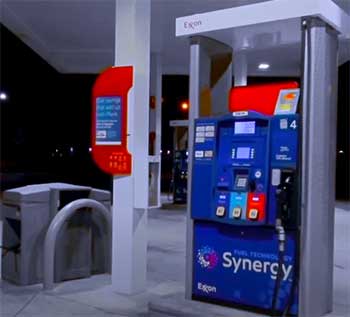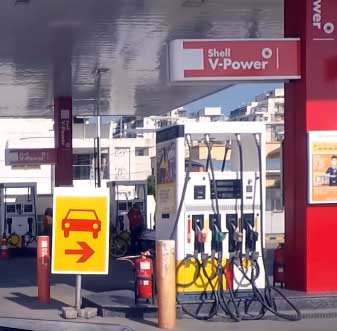For most of us, a trip to the gas station is simply an item to check off our to-do list. We pull up, fill up, and drive off, usually with little thought to the type of gas we’re putting in our tanks.
But should we be more discerning?
Today we’re examining two industry heavyweights: Exxon Synergy and Shell V-Power. By diving into the key features and benefits of these products, we’ll provide you with the knowledge you need to make an informed choice the next time you’re at the pump.
A Brief Comparison Table
| Features | Exxon Synergy | Shell V-Power |
| Engine Cleaning | Yes | Yes |
| Engine Protection | No | Yes |
| Fuel Economy | Yes | No |
| Performance Enhancement | No | Yes |
| Availability | Widespread | Less widespread |
| Fuel Options | Fewer grades | Gasoline and Diesel |
The Lowdown on Exxon Synergy

Exxon Synergy is the fuel offering from ExxonMobil, a household name in the global energy industry.
Synergy fuel is no mere ‘normal’ gas. It is designed to provide a host of benefits that are sure to catch the eye of any discerning motorist.
Pros of Exxon Synergy
- Engine Cleaning: Exxon Synergy is packed with seven key ingredients that work together to clean your engine. This helps to improve fuel efficiency and extend your car’s life.
- Fuel Economy: Exxon Synergy fuels are designed to give your car more miles per gallon, translating into significant savings over time.
- Availability: ExxonMobil’s vast network of stations ensures that you can easily find Synergy fuel no matter where you are in the United States.
Cons of Exxon Synergy
- Cost: Exxon Synergy tends to be pricier than standard fuels, which may deter budget-conscious drivers.
- Limited Options: Exxon Synergy comes in fewer grades compared to other brands, potentially limiting choice for drivers with specific fuel needs.
Delving into Shell V-Power
Next on our list is Shell V-Power, a premium fuel offering from another industry giant, Shell. Shell’s reputation for quality and innovation is well reflected in V-Power.
Pros of Shell V-Power
- Engine Protection: Shell V-Power is designed with DYNAFLEX Technology, which helps to protect your engine from gunk and corrosion.
- Performance: With a higher octane rating, V-Power can deliver improved performance and responsiveness, particularly in high-performance vehicles.
- Variety: Shell V-Power is available in both gasoline and diesel versions, catering to a wider range of vehicles.
Cons of Shell V-Power
- Price: Like Exxon Synergy, Shell V-Power comes at a higher price point than regular fuels.
- Availability: While Shell stations are widespread, not all of them carry V-Power, which could be an inconvenience for some drivers.
Key Differences Between Exxon Synergy And Shell V-Power
While Exxon Synergy and Shell V-Power both claim to offer improved performance and protect your engine, their methodologies and particular focuses are different. Let’s delve deeper into their unique qualities.
- Engine Cleaning Vs. Engine Protection

Exxon Synergy boasts of a unique formula with seven ingredients that work together to clean your engine.
This helps to remove deposits that can impact engine performance and fuel economy.
On the other hand, Shell V-Power is formulated with DYNAFLEX Technology, a proprietary formula that not only helps clean the engine but also provides protection from gunk and corrosion.
- Fuel Economy Vs. Performance Enhancement
Exxon Synergy is designed with an eye on fuel economy.
It aims to provide more miles per gallon, which can lead to substantial savings over time.
Shell V-Power, conversely, places an emphasis on performance enhancement. Its higher octane rating can deliver improved performance and responsiveness, especially in high-performance vehicles.
- Availability
While both Exxon and Shell have a vast network of fuel stations across the United States, Exxon Synergy might have an edge in terms of availability. Synergy fuel is a staple offering at most ExxonMobil stations.
Shell V-Power, while available at many Shell stations, is not as universally offered.
- Options
Shell V-Power takes the lead in terms of options. It comes in both gasoline and diesel variants, offering a choice to drivers with different types of vehicles. Exxon Synergy, on the other hand, comes in fewer grades, which might limit options for drivers with specific fuel needs.
While both Exxon Synergy and Shell V-Power offer unique advantages, the choice between the two ultimately depends on what you value most as a driver.
Whether it’s engine cleaning, fuel economy, engine protection, or performance enhancement, these fuels offer you the opportunity to make a choice that best suits your needs.
Also Read: Differences Between Sunoco And Shell Gas.
Frequently Asked Questions (FAQ)
This largely depends on your specific needs. Exxon Synergy is known for its engine-cleaning properties and fuel economy, while Shell V-Power offers engine protection and performance enhancement. So, evaluate your priorities and choose accordingly.
Exxon Synergy is a premium fuel, meaning it’s enhanced with additives to provide benefits like engine cleaning and improved fuel economy. It’s not just ‘normal’ gas, it’s designed to optimize your engine’s performance.
Synergy gas has its advantages, such as engine cleaning and improved fuel economy. Whether it’s ‘better’ depends on your needs. If these are priorities for you, then yes, Synergy gas may be a better choice.
Some people believe Exxon gas, especially Exxon Synergy, is better due to its unique blend of seven ingredients designed to clean the engine and improve fuel economy. However, whether it’s ‘better’ will depend on your specific needs and priorities as a driver.
The Verdict
Is Exxon Synergy better than Shell V-Power?
Or vice versa?
The answer really depends on what you value as a driver. Both offer unique advantages – if engine cleaning and fuel economy are your priorities, Exxon Synergy may be the way to go. However, if you’re after engine protection and improved performance, Shell V-Power could be a better fit.
And remember, while these premium fuels do come at a higher cost, the long-term benefits to your vehicle’s health and performance can make them a worthy investment.



